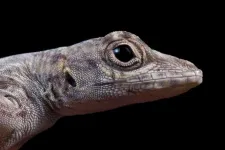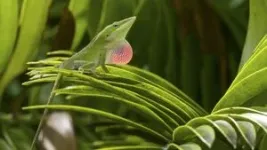(Press-News.org) Charles Darwin said that evolution was constantly happening, causing animals to adapt for survival. But many of his contemporaries disagreed. If evolution is always causing things to change, they asked, then how is it that two fossils from the same species, found in the same location, can look identical despite being 50 million years apart in age?
Everything changed in the past 40 years, when an explosion of evolutionary studies proved that evolution can and does occur rapidly — even from one generation to the next. Evolutionary biologists were thrilled, but the findings reinforced the same paradox: If evolution can happen so fast, then why do most species on Earth continue to appear the same for many millions of years?
This is known as the paradox of stasis, and James Stroud, assistant professor in the School of Biological Sciences at the Georgia Institute of Technology, set out to investigate it. He conducted a long-term study in a community of lizards, measuring how evolution unfolds in the wild across multiple species. In doing so, he may have found the answer to one of evolution’s greatest challenges.
His research was published as the cover story in the Proceedings of the Natural Academy of Sciences.
“We call this a paradox because it doesn’t seem to make any sense,” Stroud said. “The most common explanation is that natural selection is working to stabilize a species’ appearance, with the assumption that an average form will help them survive the best. The problem is, when people do field studies, they almost never find that this kind of ‘stabilizing’ selection actually exists.”
Lassoing Lizards
Stroud set up a field study with four different species of Anolis lizards (anoles) on a small island at the Fairchild Tropical Botanic Gardens in Coral Gables, Florida. He measured natural selection in all four lizard species over five consecutive time periods by catching and monitoring the survival of every lizard on the island.
Stroud and his colleagues searched day and night for lizards. Using long fishing poles with tiny lassos at their tips, they gently captured them by their strong necks, placed them in coolers, and documented the exact branch or stump where they found each lizard.
Back in the lab, Stroud measured the lizards’ heads, legs, feet, weight, and even the stickiness of their toes. After assigning an identifying number to each lizard and marking them with a tiny tag under the skin, the team released the lizards to the same branches where they’d found them. They went out in the following days and weeks to catch the rest of them.
Every six months for three years, Stroud and his team started the process over again. Catching the same lizards, taking measurements, releasing them, and making notes of which lizards survived and which didn’t.
A Picture of Evolution Is Worth a Thousand Lizards
By incorporating data for each time period, Stroud captured the history of every lizard in the community. He then related survival data to the variation in body traits, which allowed him to analyze which body traits were important predictors of survival. Taken together, the analysis painted a picture of how natural selection operated on the community as a whole.
To his surprise, Stroud found that the stabilizing form of natural selection — that which maintains a species’ same, average features — was extremely rare. In fact, natural selection varied massively through time. Some years, lizards with longer legs would survive better, and other years, lizards with shorter legs fared better. For other times, there was no clear pattern at all.
“The most fascinating result is that natural selection was extremely variable through time,” Stroud said. “We often saw that selection would completely flip in direction from one year to the next. When combined into a long-term pattern, however, all this variation effectively canceled itself out: Species remained remarkably similar across the entire time period.”
The findings provided by Stroud’s study had never been seen before. There had never been such insight into how selection works on a community level, and certainly not at this level of detail.
The reason scientists never understood how evolution works on the community level is because long-term studies like Stroud’s are extremely rare. Researchers are unlikely to undertake such projects because of the great amount of work and time required.
“Evolution can and does happen — it’s this ongoing process, but it doesn't necessarily mean things are constantly changing in the long run,” Stroud said. “Now we know that even if animals appear to be staying the same, evolution is still happening.”
According to Stroud, understanding evolution is critical to everything that we want to understand about life on Earth.
“Understanding evolution doesn’t only help us understand the plants and animals around us and how they're distributed across the world,” he said. “It also shows us how life sustains itself in a world dominated by humans.”
There have been very few studies that monitor how evolution unfolds in the wild at long time scales. That, according to Stroud, is why we have a biased view of what evolution is.
“For a very long time, evolutionary biologists have tried to figure out what was behind this paradox of stasis idea,” Stroud said. “What this study shows is that the answer may not be particularly complicated — we just had to conduct a study in the wild for a long enough time to figure it out.”
Citation: Stroud, J.T., et al. “Fluctuating selection maintains distinct species phenotypes in an ecological community in the wild.” PNAS, Oct. 2023.
DOI: https://doi.org/10.1073/pnas.2222071120
Writer: Catherine Barzler
#####
The Georgia Institute of Technology, or Georgia Tech, is one of the top public research universities in the U.S., developing leaders who advance technology and improve the human condition. The Institute offers business, computing, design, engineering, liberal arts, and sciences degrees. Its more than 45,000 undergraduate and graduate students, representing 50 states and more than 148 countries, study at the main campus in Atlanta, at campuses in France and China, and through distance and online learning. As a leading technological university, Georgia Tech is an engine of economic development for Georgia, the Southeast, and the nation, conducting more than $1 billion in research annually for government, industry, and society.
END
Long-term lizard study challenges the rules of evolutionary biology
By lassoing lizards, putting tiny chips on their legs, and tracking them for three years, Georgia Tech's James Stroud revealed why species often appear unchanged for millions of years despite Charles Darwin's theory of constant evolution
2023-10-09
ELSE PRESS RELEASES FROM THIS DATE:
No lizard is an island
2023-10-09
Many species experience little to no change over long periods of time. Biologists often fall back on the same explanation for why this is true: that natural selection favors individuals with more moderate characteristics. Individuals with more extreme features — longer limbs, for example — have a disadvantage, while more moderate or average individuals are more likely to survive and reproduce, passing on their common features.
But new research from Washington University in St. Louis and the Georgia ...
Nature is inventive - the same substance is produced differently by plants
2023-10-09
Maize plants form special compounds derived from indole, the so-called benzoxazinoids. They are considered ecologically important because they act against a wide range of herbivores and reduce their feeding. Benzoxazinoids also exhibit antimicrobial properties and are thought to be involved in mediating plant-plant interactions. Their biosynthesis in maize has been known since the 1990s. Meanwhile, their biosynthetic pathway has been described in several grasses, but benzoxazinoids have also been found in other plant species. Their distribution is peculiar: While specialized metabolites often occur in specific evolutionary related plant species, benzoxazinoids ...
AI language models could help diagnose schizophrenia
2023-10-09
Scientists at the UCL Institute for Neurology have developed new tools, based on AI language models, that can characterise subtle signatures in the speech of patients diagnosed with schizophrenia.
The research, published in PNAS, aims to understand how the automated analysis of language could help doctors and scientists diagnose and assess psychiatric conditions.
Currently, psychiatric diagnosis is based almost entirely on talking with patients and those close to them, with only a minimal role for tests such as blood tests and brain scans.
However, ...
Ancient Maya reservoirs offer lessons for today’s water crises
2023-10-09
CHAMPAIGN, Ill. — According to a new paper, ancient Maya reservoirs, which used aquatic plants to filter and clean the water, “can serve as archetypes for natural, sustainable water systems to address future water needs.”
The Maya built and maintained reservoirs that were in use for more than 1,000 years, wrote University of Illinois Urbana-Champaign anthropology professor Lisa Lucero in a perspective in the Proceedings of the National Academy of Sciences. These reservoirs provided potable water for thousands to tens of thousands of people in cities during the annual, five-month dry season and in periods of prolonged ...
Evidence from the remains of 1918 flu pandemic victims contradicts long-held belief that healthy young adults were particularly vulnerable
2023-10-09
Hamilton, ON, Oct. 9, 2023 – New analysis of the remains of victims of the 1918 influenza pandemic, which killed an estimated 50 million people worldwide, contradicts the widespread belief the flu disproportionately impacted healthy young adults.
Because so many people fell ill so quickly, physicians at the time believed the healthy were as likely to die from the flu as those who had already been sick or frail. Despite numerous historical accounts, though, it turns out there is no concrete scientific evidence to support that belief.
Researchers at McMaster University and the University of Colorado Boulder ...
Could a specialized diet alleviate long COVID?
2023-10-09
LOS ANGELES — Approximately 7% of Americans have had long COVID, a range of ongoing health problems experienced after infection and recovery from COVID-19. Symptoms can include fatigue, brain fog, headaches, chest pain, heart palpitations and more.
To date, there is no proven treatment for the syndrome, and the mechanisms that cause it are not fully understood.
Now, a new clinical trial from Keck Medicine of USC is investigating if a diet designed to lower inflammation may play a role in easing this often debilitating condition.
The premise of ...
Miriam Merad, M.D., Ph.D., elected to the National Academy of Medicine for seminal work in immunology and cell biology
2023-10-09
Miriam Merad, M.D., Ph.D., an esteemed immunologist at the Icahn School of Medicine at Mount Sinai, has been elected to the National Academy of Medicine (NAM) in recognition of her pioneering contributions to the fields of immunology and cell biology.
Dr. Merad was elected for her transformational discoveries, establishing for the first time that tissue-resident macrophages have distinct origins, maintain their lineage separately from adult hematopoiesis, and possess unique functions that enhance tissue health, repair, infection defense, and impact tumor outcomes.
She is the Mount Sinai Professor ...
New drug offers relief for treatment-resistant epilepsy patients
2023-10-09
In cases where standard therapies fail, a medication called XEN1101 reduces seizure frequency by more than 50% in some patients and sometimes eliminates them altogether, a new study shows. Unlike several treatments that must be started at low doses and slowly ramped up, the new drug can safety be taken at its most effective dose from the start, the authors say.
Focal seizures, the most common type seen in epilepsy, occur when nerve cells in a particular brain region send out a sudden, excessive burst of electrical signals. Along with seizures, this uncontrolled activity can lead to abnormal behavior, periods of lost awareness, and mood changes. ...
Capturing immunotherapy response in a blood drop
2023-10-09
*EMBARGOED UNTIL 11 A.M. MONDAY, OCT. 9*
Liquid biopsies are blood tests that can serially measure circulating tumor DNA (cell-free DNA that is shed into the bloodstream by dying cancer cells). When used in patients with advanced non-small cell lung cancer undergoing immunotherapy, they may identify patients who could benefit from treatment with additional drugs, according to a phase 2 clinical trial in the U.S. and Canada. The trial is led by investigators at the Johns Hopkins Kimmel Cancer Center and its Bloomberg~Kimmel ...
Soccer goalies process the world differently, muti-sensory integration tests show
2023-10-09
In the game of soccer (association football), goalkeepers have a unique role. To do the job well, they must be ready to make split-second decisions based on incomplete information to stop their opponents from scoring a goal. Now researchers reporting in Current Biology on October 9 have some of the first solid scientific evidence that goalkeepers show fundamental differences in the way they perceive the world and process multi-sensory information.
“Unlike other football players, goalkeepers are required to make thousands of very fast decisions based on limited or incomplete sensory information,” says Michael Quinn, the study’s ...
LAST 30 PRESS RELEASES:
New strategies boost effectiveness of CAR-NK therapy against cancer
Study: Adolescent cannabis use linked to doubling risk of psychotic and bipolar disorders
Invisible harms: drug-related deaths spike after hurricanes and tropical storms
Adolescent cannabis use and risk of psychotic, bipolar, depressive, and anxiety disorders
Anxiety, depression, and care barriers in adults with intellectual and developmental disabilities
Study: Anxiety, gloom often accompany intellectual deficits
Massage Therapy Foundation awards $300,000 research grant to the University of Denver
Gastrointestinal toxicity linked to targeted cancer therapies in the United States
Countdown to the Bial Award in Biomedicine 2025
Blood marker from dementia research could help track aging across the animal world
Birds change altitude to survive epic journeys across deserts and seas
Here's why you need a backup for the map on your phone
ACS Central Science | Researchers from Insilico Medicine and Lilly publish foundational vision for fully autonomous “Prompt-to-Drug” pharmaceutical R&D
Increasing the number of coronary interventions in patients with acute myocardial infarction does not appear to reduce death rates
Tackling uplift resistance in tall infrastructures sustainably
Novel wireless origami-inspired smart cushioning device for safer logistics
Hidden genetic mismatch, which triples the risk of a life-threatening immune attack after cord blood transplantation
Physical function is a crucial predictor of survival after heart failure
Striking genomic architecture discovered in embryonic reproductive cells before they start developing into sperm and eggs
Screening improves early detection of colorectal cancer
New data on spontaneous coronary artery dissection (SCAD) – a common cause of heart attacks in younger women
How root growth is stimulated by nitrate: Researchers decipher signalling chain
Scientists reveal our best- and worst-case scenarios for a warming Antarctica
Cleaner fish show intelligence typical of mammals
AABNet and partners launch landmark guide on the conservation of African livestock genetic resources and sustainable breeding strategies
Produce hydrogen and oxygen simultaneously from a single atom! Achieve carbon neutrality with an 'All-in-one' single-atom water electrolysis catalyst
Sleep loss linked to higher atrial fibrillation risk in working-age adults
Visible light-driven deracemization of α-aryl ketones synergistically catalyzed by thiophenols and chiral phosphoric acid
Most AI bots lack basic safety disclosures, study finds
How competitive gaming on discord fosters social connections
[Press-News.org] Long-term lizard study challenges the rules of evolutionary biologyBy lassoing lizards, putting tiny chips on their legs, and tracking them for three years, Georgia Tech's James Stroud revealed why species often appear unchanged for millions of years despite Charles Darwin's theory of constant evolution








